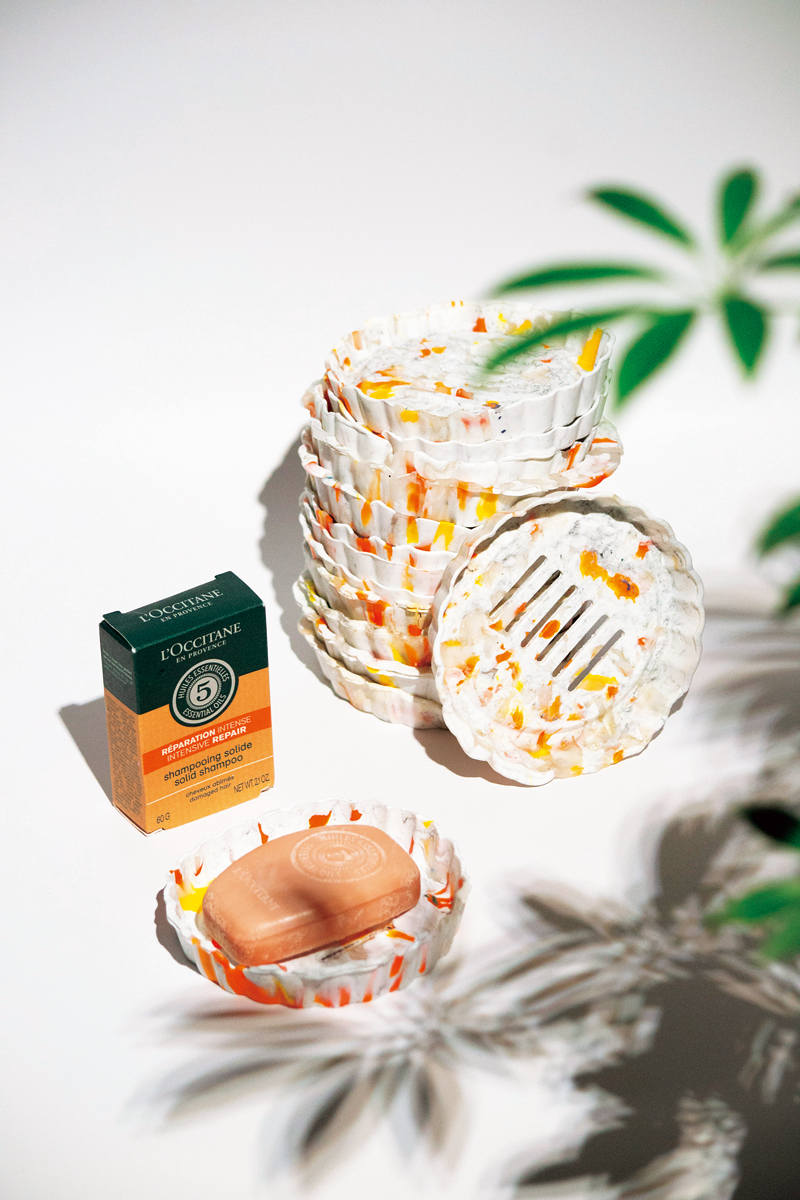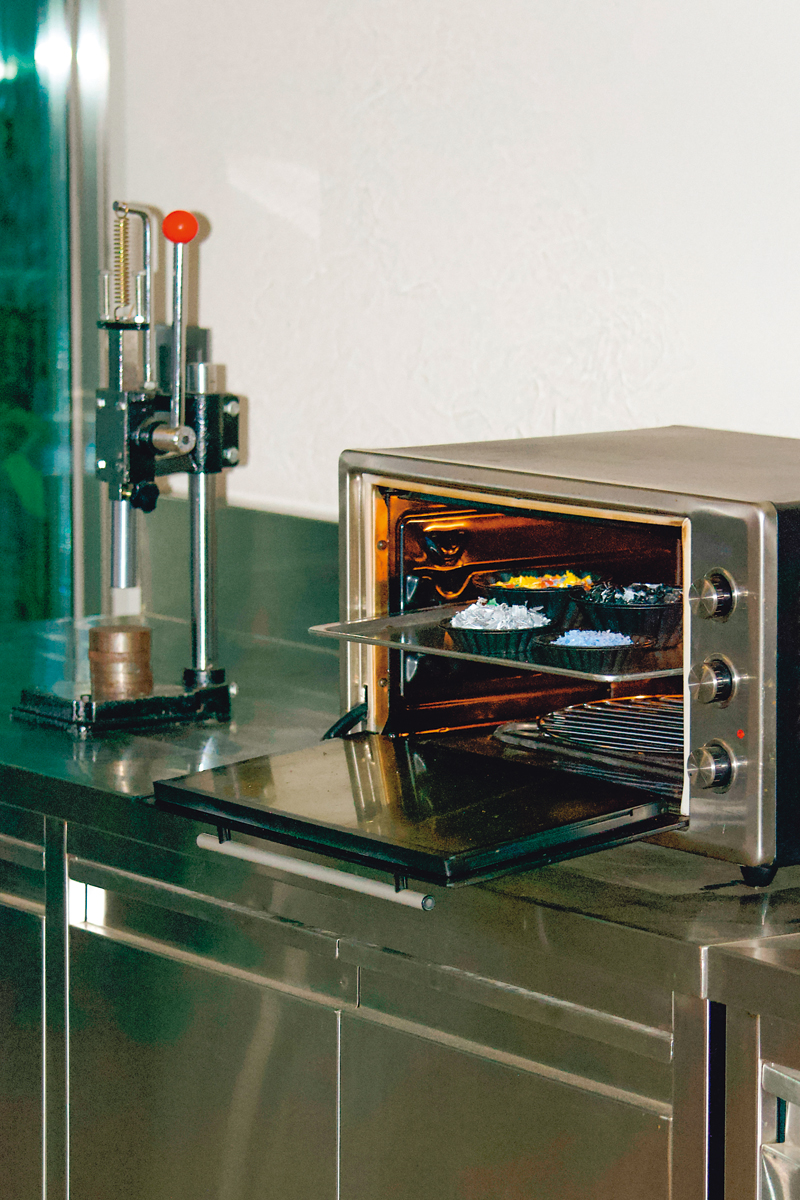Plastic Bakery is filled with ordinary baking equipment such as bread pans and ovens, but instead of flour it uses plastic bottle caps to make “baked goods.” Though not edible, the company’s tarts, canelés, and other treats still serve a purpose.
High-purity plastic flakes are transformed into household objects like incense holders, flowerpots, and trays in the shape of waffles, canelés, and tarts.
© Plastic Bakery
The word "plastic" originates from the Greek plastikos, which means “capable of being molded or shaped.” Almost anything can be made out of plastic. It’s not only found in simple everyday s such as tumblers or chairs but also as part of complicated components for smartphones and cars.
Baking with Plastic
After Belgian chemist Leo Baekeland invented plastic back in 1907, the development of products using synthetic plastic took off in the 1920s. Roughly a hundred years later, Plastic Bakery was established, a company using plastic bottle caps to create handmade accessories resembling baked goods. Ground plastic waste is first measured out and baked or shaped in a mold. The processed plastic is then transformed into baked goods with variegated patterns
What was the origin of Plastic Bakery’s unusual products? The company’s CEO, Park Hyong-ho, is neither a baker nor an art major. He majored in electrical engineering and went on to obtain a master’s degree in smart design engineering. That’s what sparked his interest in sustainable development.
“When I was at graduate school, I attended a circular economy design workshop in Hong Kong, co-hosted by Hong Kong University of Science and Technology and the International Design School for Advanced Studies at Hongik University. It made me aware of what an important global agenda resource circulation is. I was especially impressed with the Precious Plastic project, which recycles plastic to turn it into valuable resources. It inspired me to plan and realize a resource circulation project back in Korea,” he says.
Returning home, Park began to think about starting an eco-friendly business. One day, during his search for a completely new type of project, he came across a bread pan at Bangsan Market in Euljiro, close to his office in central Seoul. The market specializes in industrial subsidiary materials and packaging products but also has an alley for stores selling baking utensils. Inspired by the bread pan, Park thought it might be fun to use plastic as if it were dough for baked goods.
Challenges and Collaborations
Park first tried cooking plastic in a waffle maker and an oven. Plastic could be easily molded, but fine-tuning the temperature, pressure, and duration wasn’t easy. When the temperature was too high, holes formed on the surface, and when it was too low, it was difficult to create the desired shape. After much trial and error, Park eventually achieved the colors he wanted and found the optimal conditions to successfully mold the plastic into the shapes he wanted. Plastic Bakery now boasts proprietary know-how in differentiating the temperature for separate parts of the molds.
Parks specifically chose discarded plastic bottle caps, because, unlike the transparent bottles they used to seal, they are small in size and difficult to sort, meaning they were not being properly recycled. In the beginning, Park and his team would squat in front of recycling areas in residential neighborhoods to collect and carefully sort these bottle caps. Since 2023, they have had an arrangement with the Chuncheon Self-Sufficiency Promotion Center, which collects, washes, and dries the caps and delivers them as crushed flakes.

Plastic Bakery looks to create a better tomorrow by bringing together recycling, pragmatism, and aesthetics and collaborating with many different brands.
© Plastic Bakery
With these high-purity flakes, Plastic Bakery produces waffles, canelés, and tarts, which take on new life as household objects such as incense holders or flowerpots. Leading companies quickly recognized the value of these products. The global cosmetics brand L’Occitane collaborated with Plastic Bakery to produce a tart-shaped soap dish, using the company’s bottle cap flakes. It set an example for practical, aesthetically pleasing, and eco-friendly products. Logitech, which has established itself as a brand focusing on sustainable design and innovation, offered a package that included Plastic Bakery’s canelé-shaped pencil holder and pebble-shaped business card stand. Other partners include Kia Motors, LG H&H, and Lush. Plastic Bakery gets a steady stream of inquiries about product exhibitions as well as workshops for the general public, management, and staff.
Park says he started the business with good intentions but was also concerned. “Will people get it? Will the products sell? If I don’t make a profit, it won’t be sustainable. However, many companies offered to collaborate with us, and thankfully we were able to find our own way. Instead of mass-producing a particular type of product, we’re experimenting with the many possibilities of plastic recycling. We choose to straddle the border between commercial products and art. Once I stopped focusing on commercial success, opportunities opened up to explore new areas.”
Currently, Plastic Bakery draws pictures or writes inscriptions on its baked accessories with a 3D pen, making each object one of a kind. The filament for the pen is also made from recycled plastic. Recently, the company developed bean bags filled with plastic bottle caps and designed spaces using recycled products, a prime example being an artificial forest inside the Kia EV6 Unplugged Ground in Seongsu-dong, Seoul.
FROM POTENTIAL TO SUSTAINABILITY
At Plastic Bakery, plastic is considered another word for “possibilities,” with its resistance to biodegradation embraced as an opportunity rather than a drawback. As the world grapples with the immense impact of plastic on the environment, Park offers a message of hope. “Plastic has significantly enhanced the quality of life, not only for humans but for many other species as well. We were able to save elephants from extinction by replacing ivory with plastic and slowed the pace of the Amazon rainforest’s destruction by days, many don’t appreciate the value of plastic,” he says. “It’s important to acknowledge the positive impact that plastic has had, as well as its history. Only then is coexistence with plastic possible. What we need to address is the fact that plastic is difficult to naturally recycle.”

When baking the plastic canelés, tarts, and waffles in the oven, the time and temperature have to be adjusted depending on the product.
© Plastic Bakery
Addressing sustainability-minded artists and companies, Park advises “sufficient thinking and research.” A product that has not been well thought out can lead to more waste. He aims to keep improving his company’s baking techniques while also looking for new ways to circulate resources.
“More and more companies are paying attention to resource circulation and achieving visible results, including NoPlasticSunday, Would You Love, and LOWLIT COLLECTIVE. Plastic Bakery will continue to work on enhancing brand value and awareness, so that more people will feel the same about the possibilities of plastic circulation.”
Ultimately, everyone decides for themselves what is and isn’t possible. Plastic Bakery focuses on what’s possible — a sustainable use of plastic to protect the Earth.